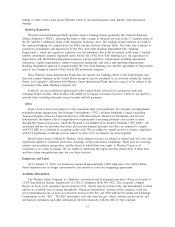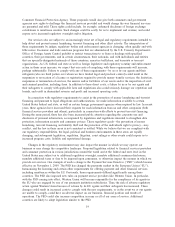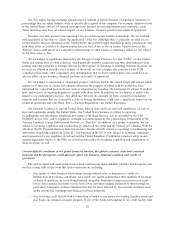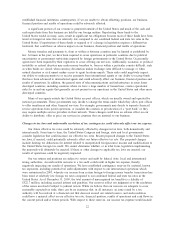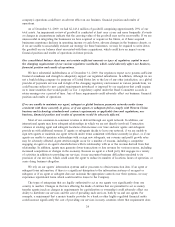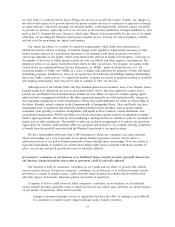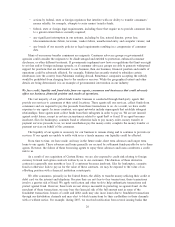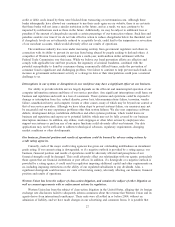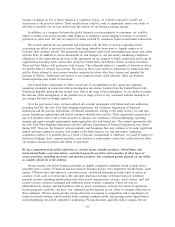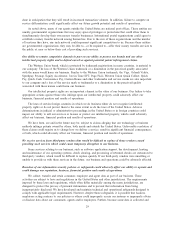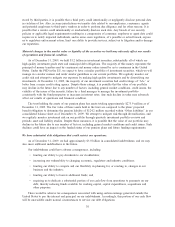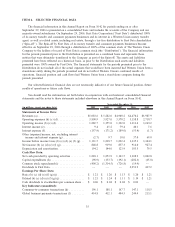Western Union 2009 Annual Report Download - page 39
Download and view the complete annual report
Please find page 39 of the 2009 Western Union annual report below. You can navigate through the pages in the report by either clicking on the pages listed below, or by using the keyword search tool below to find specific information within the annual report.not exist today or could prevent us from offering our services in an affected country. Further, any changes in
law that would require us to provide directly the money transfer services to consumers as opposed to through
an agent network—effectively changing our business model—could significantly adversely impact our ability
to provide our services, and/or the cost of our services, in the relevant jurisdiction. Changes mandated by laws
such as the EU Payment Services Directive, which make Western Union responsible for any acts of its agents
while they are providing the Western Union money transfer service, increase our risk of regulatory liability
and our costs for monitoring our agents’ performance.
Our agents are subject to a variety of regulatory requirements, which differ from jurisdiction to
jurisdiction and are subject to change. A material change in the regulatory requirements necessary to offer
money transfer services in a jurisdiction important to our business could mean increased costs and/or
operational demands on our agents, which could result in the attrition of agents and subagents, a decrease in
the number of locations at which money transfer services are offered and other negative consequences. The
regulatory status of our agents could affect their ability to offer our services. For example, our agents in the
United States are considered Money Service Businesses, or “MSBs,” under the Bank Secrecy Act. An
increasing number of banks view MSBs, as a class, as higher risk customers for purposes of their anti-money
laundering programs. Furthermore, some of our agents have had difficulty establishing banking relationships
due to the banks’ credit policies. If a significant number of agents are unable to maintain existing or establish
new banking relationships, they may not be able to continue to offer our services.
Although most of our Orlandi Valuta and Vigo branded agents are not exclusive, most of our Western Union
branded agents have offered our services on an exclusive basis—that is, they have agreed by contract not to
provide any non-Western Union branded money transfer services. While we expect to continue signing agents
under exclusive arrangements and believe that these agreements generally are valid and enforceable, changes in
laws regulating competition or in the interpretation of those laws could undermine our ability to enforce them in
the future. Recently, several countries in the Commonwealth of Independent States, Africa and South Asia have
promulgated laws or regulations that effectively prohibit payment service providers, such as money transfer
companies, from agreeing to exclusive arrangements with agents in those countries. Certain institutions, non-
governmental organizations (NGOs) and others are actively advocating against exclusive arrangements in money
transfer agent agreements. Advocates for laws prohibiting or limiting exclusivity continue to push for enactment of
similar laws in other jurisdictions. The inability to enter into exclusive arrangements or to enforce our exclusivity
rights under our contracts could adversely affect our operations and revenue by, for example, allowing competitors
to benefit from the goodwill associated with the Western Union brand at our agent locations.
We have relationships with more than 6,300 businesses to which our consumers can make payments.
These relationships are a core component of our global business payments services, and we derive a
substantial portion of our global business payments revenue through these relationships. If we are unable to
sign new relationships or maintain our current relationships under terms consistent with those currently in
place, our revenue and profit growth rates may be adversely affected.
If consumers’ confidence in our business or in traditional money transfer providers generally deteriorates,
our business, financial position and results of operations could be adversely affected.
Our business is built on consumers’ confidence in our brands and our ability to provide fast, reliable
money transfer services. Erosion in consumers’ confidence in our business, or in traditional money transfer
providers as a means to transfer money, could adversely impact transaction volumes which would in turn
adversely impact our business, financial position and results of operations.
A number of factors could adversely affect consumers’ confidence in our business, or in traditional
money transfer providers generally, many of which are beyond our control, and could have an adverse impact
on our results of operations. These factors include:
• changes or proposed changes in laws or regulations that have the effect of making it more difficult
for consumers to transfer money using traditional money transfer providers;
25


